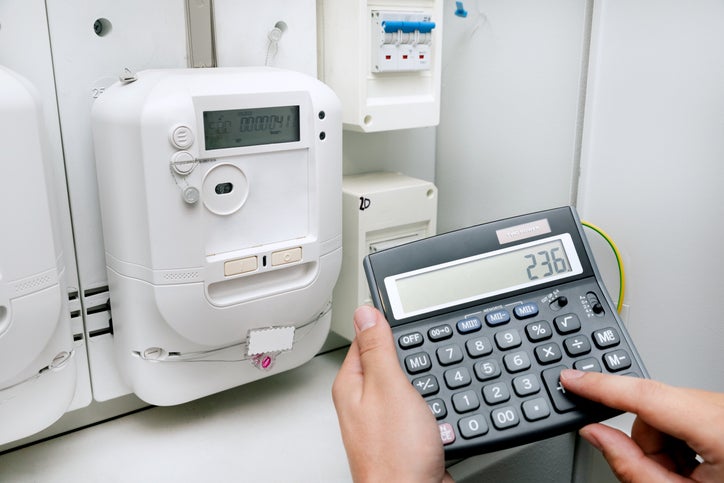* By submitting your details you agree to our terms and conditions and privacy policy . We promise we won’t share your data with others for marketing purposes.
Compare business energy prices

Business energy is different. No price cap & no cooling off

Compare, switch & renew business energy to beat price volatility

Bionic is the comparison site for your small business
Compare Energy Prices
By clicking 'Compare Energy Prices' you agree for us to search your current energy supplier and usage through industry held data. Enter manually

We compare from a panel of business energy suppliers
No long forms. Start a comparison with just your postcode. We use smart data to find energy info.
Compare quotes from a panel of energy suppliers. Including big names and specialist providers.
An energy expert will talk you through the quotes on screen and support you with the switch.
Why compare...
business energy quotes?
Most people compare business energy quotes to see if they cut the cost of their energy bills.
To avoid overpaying for energy, you should compare quotes and line up a new contract before your current one ends. This means you can pick the cheapest rates on offer from a range of suppliers and (maybe even more importantly) avoid rolling onto your supplier's out-of-contract rates.
Out-of-contract rates are your supplier's default business energy tariff. They are variable and usually much more expensive than fixed-rate tariffs.
It's not all about price, though. When you compare business energy quotes with Bionic, we consider your business's needs. If you want greater peace of mind in an unpredictable energy market, we can help you decide whether locking in a lower rate for a longer period makes more sense.
And no one wants the hassle of their energy supplier going bust. That's why we work with a panel of trusted suppliers who offer reliable service and great rates. If you like what's on offer, we'll support you with the switch and automatically send you new quotes when it's time to renew.
Click to compare today's rates or speak to one of our tech-enabled energy experts on 0800 860 6833
What business energy contracts are available?
When comparing new business energy deals, there are several different options available. We'll help you choose the one that's right for your business. There are also a couple you need to avoid - deemed rates and out-of-contract rates. These are suppliers' default variable tariffs and usually more expensive than fixed rate contracts.
Fixed rate contracts
Unit rates and standing charges are fixed for the length of your contract.
Variable rate
With a variable-rate contract, your unit rate and standign charge can change, depending on market conditions.
Time of use tariff
A time of use tariff charges less for energy usage during certain hours.
Blend and extend
Your supplier offers to extend your contract at rates between what you’re paying now and the current market rates.
Flex approach
You bulk-buy energy in advance, giving you access to wholesale rates. Usually best for high usage businesses.
Pass through
Your business energy bill is split between fixed wholesale rates, and other charges like National Grid and TNUoS.
Deemed rates
Your supplier's default rates if you don’t arrange a fixed contract before moving into new premises. Avoid.
Out-of-contract rates
Suppliers put you on out-of-contract rates if you don't sort a new contract to start when your current one ends. Avoid.
Why get expert help from Bionic to compare business energy?
How Digital Renewals can save you time and money
Switching business energy with Bionic means there’s no need to worry about renewals. When it’s time to renew, we’ll automatically compare quotes and line up your next contract – this could save you up to £1,600* a year on your previous contract!
Still not sure? Here are three reasons why Digital Renewals can benefit your business:
- Never roll onto your supplier’s out-of-contract rates - We line up your next contract early to make sure there’s no expensive gap between contracts
- Access to exclusive rates negotiated by Bionic - We use collective buying power to negotiate exclusive rates from our panel of suppliers
- Save time and money on renewals – We automatically compare quotes and email you the results. More than 60% of Digital Renewal customers save an average of £500 per year**
At Bionic, we manage more business energy renewals on behalf of customers than anyone else in the market. We expect to save Digital renewal customers over £10million*** this year!
For more information, check out Everything you need to know about Digital Renewals.
* Based on Digital Renewal customers being renewed in January 2025. Across 3,600 customers, 2,000 with a saving. 20% of customers with a saving of over £1,600 per year.
** Based on Digital Renewal customers being renewed in January 2025. Across 3,600 customers, 2,000 with a saving. Spend based on latest consumption readings, with changes only in rates themselves
*** Based on the average annual saving for Digital renewal customers in January 2025. Multiplied out across a full year of Digital renewals, assuming no change in market movement.
How much should your business pay for energy?
Our business gas and business electricity pages have the latest energy rates and standing charges for February 2025. Below are some things to consider when comparing business energy rates.
- When you compare business energy rates, it's unlikely that the rates you're quoted will be cheaper than the rates you're currently paying. This is because, as with the price of most things, energy prices tend to increase steadily over time. If you renew after a long-term fixed deal, rates may have risen considerably since you last took out a new contract.
- Even though energy prices have been coming down since they spiked in 2022, and the market has become less volatile, rates are still higher than at any time since about September 2021.
- At Bionic, we aim to find the best possible rates for your next energy contract compared to what you might pay elsewhere or against your current supplier’s out-of-contract rates. Unlike domestic energy contracts, there are no off-the-shelf tariffs. This means your quote will be tailored to the needs of your business, and the price you pay will be determined by the size of your business, how and when it uses energy, and its location, among other things.
Or speak to one of our tech-enabled energy experts on 0800 860 6833
How much is an average business energy bill?
The amount you pay for your energy will depend on the type of deal your business is on, how and when you use energy, as well as the energy efficiency of your workplace. The size and location of your business will also play a part.
But, to give you a rough idea of how much you should be paying, check out the following estimates:
| Business size | Estimated annual gas bill | Estimated annual electricity bill | Can you cut your business energy bills? |
| Micro Business | £914 (based on annual usage of 10,000 kWh) | £2,715 (based on annual usage of 10,000 kWh) | Compare business energy prices |
| Small Business | £1,847 (based on annual usage of 22,500 kWh) | £5,751 (based on annual usage of 20,000 kWh) | Compare business energy prices |
| Medium Business | £3,691 (based on annual usage of 47,500 kWh) | £11,686 (based on annual usage of 40,000 kWh) | Compare business energy prices |
| Large Business | £5,267 (based on annual usage of 65,00 0kWh) | £13,438 (based on annual usage of 55,000 kWh) | Compare business energy prices |
To learn more about business energy bills, check out our guide to understanding business energy bills. To compare the latest rates and standing charges, go to our business gas and business electricity pages.
Note: Prices are correct as of June 2025. Rates and bill size may vary according to your meter type and business location. The prices you’re quoted may be different from the averages shown. The figures shown are the average unit rates and standing charges quoted by Bionic per business size from January 1 to June 6, 2025.
What types of business energy contracts are available?
When comparing new business energy deals, you may have several types of contracts to choose from:
- Fixed-term energy tariffs – These usually last between one and four years, during which time the unit cost and standing charges stay the same.
- Blend and extend tariffs - These deals allow you to extend the length of your current contract with the same supplier, who will then reward your loyalty with lower rates.
- Flex approach tariffs – With this type of tariff you can take advantage of favourable wholesale rates by buying your energy for the months or years ahead, usually when costs are low.
- Pass-through tariffs - A pass-through tariff splits your bill in two between the wholesale energy costs, which are fixed, and the other elements that make up the unit rates, which vary and are most suited to businesses that don’t need price certainty.
- Time of use tariffs - A time of use or ‘Off-peak’ tariff charges less for energy usage throughout the night. You're rewarded with lower unit prices for using energy at times that put less demand on the grid.
Each is designed to meet the different needs of business energy users. To find out more, check out our guide to business energy tariffs.
What affects business energy prices?
It might feel like energy prices are always rising, but they actually fluctuate, which can make the timing of your switch all the more important. There are a number of reasons why prices go up and down:
- An increase in demand - Energy prices dropped to record lows during the first lockdown of 2020, as industrial energy demand plummeted. But as things have gotten back to normal and the demand for power increases, the prices have gone up.
- Global events - Oil prices are influenced by global events as well as supply and demand. If there are conflicts, political uncertainty, or natural disasters in a country that produces oil or gas, this will limit production and accessibility, pushing up prices. For example, in 2019, a political crisis and U.S. sanctions on Venezuela caused a spike in oil prices that pushed up global energy prices.
- The strength of the pound - As with any commodity, fluctuations in currency value can affect the cost of energy. As the UK imports a lot of its energy from Europe, the strength of the pound against the euro plays a part in costs. If the pound is strong against the euro, then prices should fall as energy is cheaper. If the pound is weak against the euro, prices are likely to rise.
- The weather - A cold winter can increase energy demand. This usually means prices go up. As we use more renewable energy sources, a drop in wind could means more natural gas is diverted to power stations. This can also push prices up. leading to increased prices.
- The price cap - Introduced to end 'rip-off' energy prices, the price cap has given suppliers a baseline they can use for their energy prices. Although the price cap only directly affects domestic energy customers, when the energy price cap increases, it can signal price rises across the board.
- Distribution and transport costs - these include green taxes like the Climate Change Levy (CCL) payments and VAT costs which make up other costs you pay for aside from wholesale energy.
How are business and domestic energy different?
There are several ways that business energy contracts differ from domestic energy deals, including:
- There are no 'off-the-shelf' business energy tariffs. All contracts are bespoke and designed to meet the needs of the individual business
- Business energy contracts are fixed-term with no option to terminate early. Unlike domestic energy deals, there's no cooling-off period with business energy. It's important to make sure you know the terms of your contract before you sign.
- New business energy contracts can be signed up to ten months before the current contract's end date, but the new contract won't start until the current one has ended. Domestic energy users can switch to another contract at any time. They might be hit with an early exit fee unless their contract has entered its final 49 days.
- Businesses can get gas and electricity from the same supplier but there is no dual fuel option.
- Business energy rates and standing charges aren't capped. Domestic rates and standing charges have a price cap, which is the maximum suppliers can charge.
The rules are slightly different if you work or run your business from home or if you're classed as a micro business. To find out more, check out our guide micro business energy.
Who is the cheapest business energy supplier?
Energy rates are constantly changing because of how the market works and how energy is bought and sold.
Business energy contracts are designed to meet the specific needs of each business, and different suppliers offer different rates, so it's difficult to say which is the cheapest.
The only way to find out who offers the cheapest business energy rates for your business is to run a price comparison. We monitor prices from our panel of suppliers to find you our best rates. Below is a breakdown of our suppliers' current rates.
| Supplier name | Gas unit rate (kWh) | Gas standing charge (daily) | Electricity unit rate (kWh) | Electricity standing charge (daily) | Ready to switch? |
| British Gas | 7.8p | 79.0p | 26.3p | 52.5p | Compare today's prices |
| BG Lite | 7.9p | 83.2p | 26.1p | 56.0p | Compare today's prices |
| EDF Energy | 7.1p | 49.7p | 24.6p | 55.3p | Compare today's prices |
| EON Next | 6.8p | 33.46p | 25.6p | 33.7p | Compare today's prices |
| ScottishPower | 6.2p | 35.8p | 22.5p | 80.5p | Compare today's prices |
| Smartest Energy | - | - | 24.0p | 57.2p | Compare today's prices |
| Valda Energy | 6.4p | 53.0p | 23.8p | 74.1p | Compare today's prices |
| Yu Energy | 6.1p | 43.8p | 22.7p | 87.4p | Compare today's prices |
Note: Prices are correct as of June 2025. Rates and bill size may vary according to your meter type and business location. The prices you’re quoted may be different from the averages shown. The figures shown are the average unit rates and standing charges quoted by Bionic per business size from June 1 to June 6, 2025.
We can also compare rates from other suppliers not listed above, including Crown Gas & Power, SSE, TotalEnergies, Corona, Engie, and more.
When choosing an energy supplier, price isn’t the only thing you should consider. You need a contract that best suits your business needs. We compare quotes from a panel of energy suppliers to find a contract that works for your business. Let us know if you’d prefer to switch to any specific suppliers on the list.
Click to compare today's rates or speak to one of our tech-enabled energy experts on 0800 860 6833
How Bionic business energy comparison works
Compare business energy quotes in three simple steps
1
Start your quote online
Start a business energy comparison with just your postcode
2
We do the comparison
We compare quotes from our panel of business energy suppliers
3
You choose your new supplier
You choose the supplier and rates you like best
What info do I need to compare business energy?
We can start your business energy comparison with just your postcode. And we use smart data to help cut the amount of form-filling. But it could help if you have the following info to hand.

The name of your current supplier and your account number

The address of your business

Your monthly or annual business energy usage

Recent meter readings
Business Energy FAQs
To help you understand more about comparing business energy and switching suppliers, here are the answers to some of our most frequently asked questions.
Our team shares essential knowledge on business energy

Is there an energy price cap for business?
There is no price cap on business energy. Instead, government support for businesses is given by way of a discount on energy unit rates. Here’s all you need to know.

Is commercial energy different to household energy?
Although it comes from the same sources – and possibly the same supplier – business energy is different to household energy. Here’s all you need to know.

How does being a micro business affect your energy contract?
Being a micro business affects the terms of your business energy contract. But what is a microbusiness? And does being one get you a better energy deal?

Why are energy prices so high? Are they still going up?
What is going on with energy prices in the UK? There's an energy crisis across the globe, with a number of major issues causing price volatility. Here's all you need to know.
Not your usual boring business content!

Sign-up to The Backbone, our free fortnightly newsletter for anyone who owns, runs, or works in one of the millions of businesses across the UK. Get the inside track from real business owners just like you




